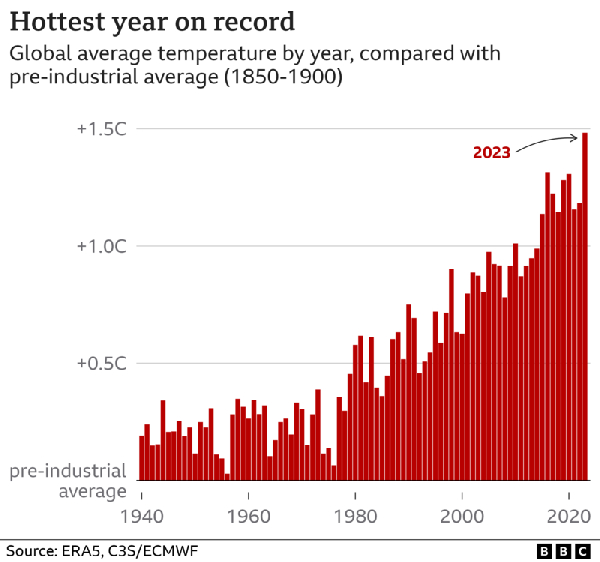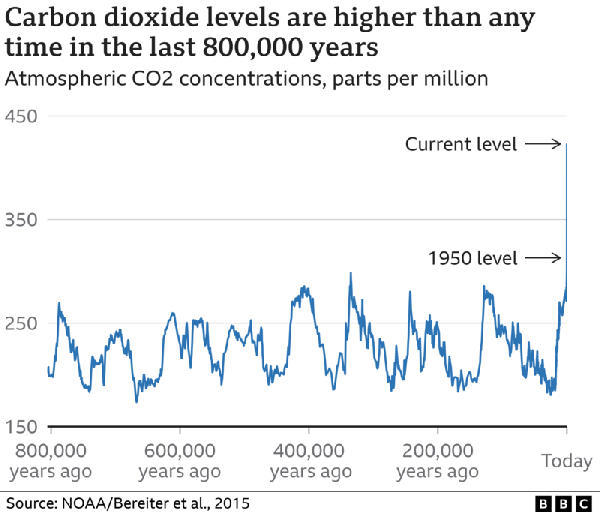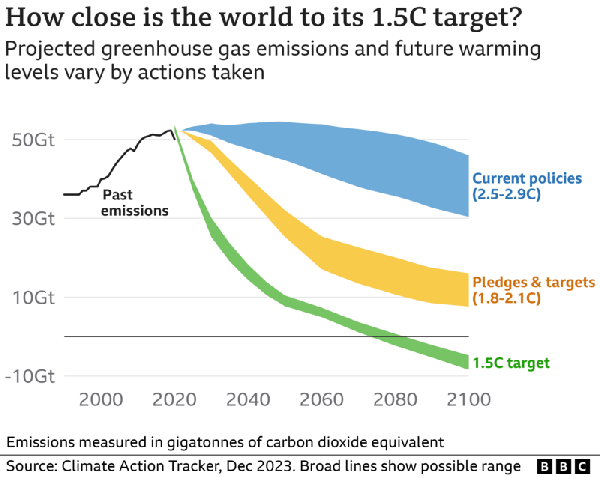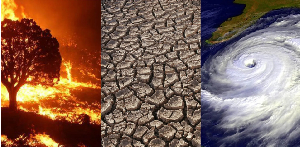For places like Kano, for northern Nigeria dis period, di temperature hot reach 43-45 degrees Celsius, and di heat dey make pipo sick and e fit even cause death, especially for old pipo.
For one interview wit BBC Pidgin, di Kano Health Commissioner, Mr Abubakar Labaran yan say di extreme heat dey make more pipo for Kano die. E explain say e dey happen every hot season.
"Di hot weather dey cause more malaria, wey dey lead to more deaths.
"Pipo dey go see doctor only wen dem dey very sick, so e hard for doctors to help dem," e add.
Di commissioner yan say during dis time, some pipo dey sick well-well from di heat, especially old pipo and those wey dey work outside.
Mr. Salisu Musa Gyaranya, wey be pesin wey dey take care of one of di biggest cemeteries for Kano, wey dey for Gauron Dutse area of di state, confam say dem don notice increase for burials for di cemetery since di hot season start.
According to Mr. Musa, "We don dey bury around 24-30 bodies everyday during some periods."
Dis mata though no be only for Kano for Nigeria pipo dey experience am.
Human activities dey make di temperature for di world to rise and na im make more ogbonge heatwaves and rising sea-levels dey happun.
E dey likely say tins go worse for future but scientists dey argue say urgent action fit reduce di worst effects of di climate change.
Wetin be climate change?
Climate change na wetin dem dey call di long term shift of di average temperature of Earth and weather conditions.
In di last 10 years, di world don dey on average around 1.2C higher dan wetin e be during di late 19th Century.
Now, e dey confirmed say di global warming bin pass 1.5C from February 2023 and January 2024. Dis dey come afta dem call 2023 di warmest year on record.
Di temperature increase na sake of climate change wey human beings cause and wey di natural El Niño weather phenomenon dey ginger.
How pipo dey cause climate change?
Di climate don dey change all through di history of Earth and natural facts like El Niño fit affect weather for short time as e happun for 2023.
But UN Climate joinbodi, IPCC say natural causes no fit explain dis fast warming wey don dey happun in di last 100 years.
IPCC say dis long term climate change na tins wey human beings dey do cause am, most especially di general use of fossil fuels like coal, oil and gas for houses, factories dem and to waka from place to place.
Wen dis fossil fuels dey burn, dem dey comot greenhouse gases like carbon dioxide (CO2). Dis gas dey trap extra energy for di atmosphere wey dey near di Earth surface, wey dey make di planet to dey hot.
Since wen di Industrial Revolution wen pipo start to dey burn plenti fossil fuels, di amount of CO2 for di atmosphere don rise by like 50%.
Di CO2 wey dey comot wen pesin burn fossil fuel get one unique chemical fingerprint wey resemble di type dem dey find for di atmosphere.
Wetin climate change don spoil so far?
Di fact na say di global average temperature increase of 1.2C wey don dey recorded in di past decade no look like much.
But e don get ogbonge effect on di environment wey include:
*more frequent and serious extreme weather, like heatwaves and heavy rainfall
*fast melting of glaciers and ice sheets, plus sea-level rise
* reduction in Arctic sea-ice
*ocean warming
Pipo lives don dey change too.
For instance, some parts of East Africa don suffer dia worst drought wey dem don see in 40 years, wey make 20 million pipo to dey at risk of serious hunger.
For 2022, ogbonge European heatwaves cause some kain increase in di number of deaths.
Why di 1.5C mata dey important and how future climate change go affect di world?
Di more di average temperature don increase, di worse di impacts of climate change dey be.
To keep di long-term average rises to 1.5C dey very important, na wetin IPCC dey tok.
Di science neva sure yet but di consequences of 2C global warming instead of 1.5C fit include:
* hot days wey go dey on average 4C warmer for mid-latitudes (regions outside di poles and tropics), versus 3C at 1.5C
*Sea-level rise go dey 0.1m higher dan 1.5C, e go expose up to 10 million more pipo to tins like more frequent flooding
*More dan 99% of coral reefs go dey lost, compared with 70-90% for 1.5C
*Twice di number of plants and vertebrates (animals with a backbone) go dey exposed to unsuitable climate conditions for almost half of di geographical area wia dem dey
*Several hundred million more pipo go dey exposed to climate-related risks and dey at risk of poverty by 2050 dan at 1.5C.
Di call to limit di rise of temperature to 1.5C dey partly designed to avoid crossing wetin dem dey call "tipping points".
Afta dem pass dis limits, changes fit increase and e go turn wetin dem no fit change again like di collapse of di Greenland Ice Sheet. But e no clear wia dis limits dey.
IPCC say about 3.3 to 3.6 billion pipo dey at risk sake of climate change.
Pipo wey dey live for poorer kontris dey expected to suffer di most sake of say dem no get plenti resources to adapt.
Dis don comot questions on top fairness sake of say dis places no dey get plenti greenhouse gas emissions.
But di knock on impacts ova wide areas.
For instance, crop failure wey link to extreme weather fit raise global food prices.
Wetin goments dey do about climate change?
For ogbonge agreement wey dem sign for Paris for 2015, almost 200 kontris pledge to try keep di global warming to 1.5C.
To make dis happun, Dem suppose reach "net zero" CO2 emissions by 2050. Net zero mean say to reduce greenhouse gas emissions as much as possible and comot any remaining emissions wey dey di atmosphere.
Most kontri get or dey reason net zero targets.
But IPCC say di greenhouse gas levels still dey rise fast and fit warm pass 1.5C.
But progress dey happun for some areas like di growth of renewable energy and electric vehicles.
World leaders dey meet everi year to tok about di climate commitments.
Di most recent UN climate change summit, COP 28 bin happun for di United Arab Emirates. For di first tme, kontris don agree to contribute to move away from fossil fuels although no be by force.
Di next conference COP 29 go happun for Azerbaijan for November 2024.
Wetin pipo fit do about climate change?
Major changes need to come from goments and businesses, but pipo sef fit help:
*take fewer flights
<*use less energy
*improve home insulation and energy efficiency
*switch to electric vehicles or live car-free
*replace gas central heating with electric systems like heat pumps
*chop less red meat



BBC Pidgin of Thursday, 9 May 2024
Source: BBC
















